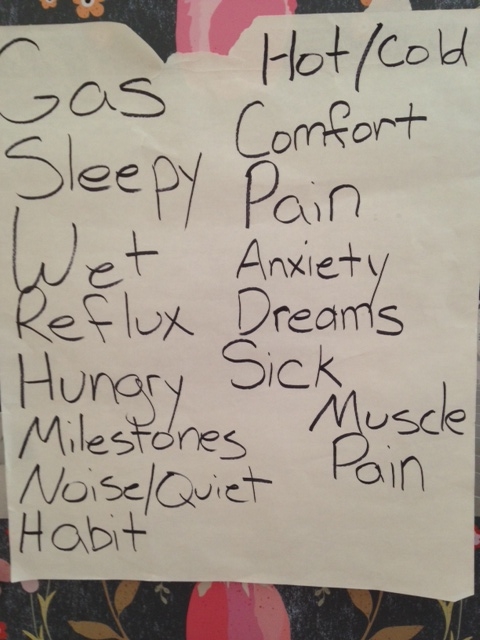Next, we brainstormed reasons that babies might wake...
<--------- As you can see, the reasons that babies might wake up are as diverse as the babies themselves!
To keep Baby's sleep into perspective and contrast it with other babies in the room, moms took turns sharing the age of their baby, what their longest interval of sleep looked like and whether or not and what they were eating.
I then shared that, according to La Leche League, sleeping through the night is about 5 hours for newborns, slightly more for older babies.
Our group's breastfed babies (newborns through age 10 months) did exactly as one would think they would: waking every 3 -5 hours. This is what we would expect because breastfed babies need to eat every 2-3 hours so baby is waking up every few hours to eat is normal and expected. Breastmilk digests within a few hours and if there isn't anything else in baby's tummy, they will likely be hungry after a few hours. Remember for most babies over 6 months but under a year, solids are still new so while Baby may be taking in some nutrition, we can't count on "a hearty dinner" sustaining them through the night! Breastmilk still meets this need for them.
Our two formula fed babies were pretty different from each other, although not different from how often they were waking: every 2-3 hours. The 8 month old had a set bedtime routine and was enjoying solids in addition to formula but mom wasn't clear whether or not he was waking out of habit/comfort or hunger. This can be hard to tell! I suggested that she experiment and send her husband in to see if baby indeed was hungry. Sometimes partner is a better one to send in because baby may be more likely to associate mom with food. If indeed, baby wants comfort, dad can provide it by soothing, rocking, singing, etc. and mom can keep sleeping. If none of that works, baby may be hungry but that's also something dad can do! The 6 month had a routine that involved dad when he came home from work...which was late so baby was up late having dinner with him. This meant bedtime was super late, baby was up a few hours later, then back to sleep, then up again, etc. I suggested to mom looking at dad doing more of the routine and having it follow dinner, not be before, as a way to "signal" bedtime and aim for an earlier hour asleep.
We talked about ways that mom could get more sleep:
- bedsharing (Evolutionary Parenting's page here has a number of useful articles about bedsharing);
- this post on routine vs. schedule is worth its weight in gold;
- taking turns with partner, having partner being the comforter, feeder, etc;
- doing a dream feed before she goes to bed;
- night weaning if she is breastfeeding.
I try to remind myself and will remind you here, dear reader, that if whatever you are doing is working for you, keep doing it. If it doesn't, then look to change it. It's only recently that I have come to terms with my own daughter's sleep. Breastfed babies (and toddlers) are usually up more often in the night, unless they are sleep-trained in some way. Not every breastfed baby or toddler of course because each child is different. I've seen that mentioned here, here and here and anecdotally as I collect stories from moms along the way. My daughter is 2.2 and this holds true for us: she is up 1-2 times per night, every night. And when I finally came to terms with this being okay and normal, I was fine. But when I worried that she wasn't getting enough sleep, that I was doing something wrong, etc., I felt horribly guilty.
We closed our conversation with a few other takeaways:
- baby crying = a need not being met;
- realistic expectations are important (see paragraph #2!);
- perspective is important...as one of my "old" moms from a previous group said," Please tell your mamas in sleep hell that it DOES get better!"
For Durham area new moms, our next gathering is September 13, 2-4 pm. Once again, we will be at my office at 1200 Broad Street, Suite 104, in Durham. RSVPs are not required! Have a suggestion for our September topic, leave me a comment below.
If you liked this post, will you click the heart below? Thanks!

